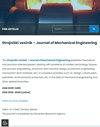Optimization of the Internal Roller Burnishing Process for Energy Reduction and Surface Properties
IF 1.2
4区 工程技术
Q3 ENGINEERING, MECHANICAL
Strojniski Vestnik-Journal of Mechanical Engineering
Pub Date : 2021-04-26
DOI:10.5545/SV-JME.2021.7106
引用次数: 10
Abstract
Improving the surface quality after burnishing operation has been the subject of various published investigations. Unfortunately, the trade-off analysis between the energy consumption and surface characteristics of the internal burnishing has been not addressed due to the expensive cost and huge efforts required. The objective of the present work is to optimize burnishing factors, including the spindle speed, burnishing feed, depth of penetration, and the number of rollers for minimizing the energy consumed in the burnishing time, as well as surface roughness and maximizing Rockwell hardness. An adaptive neuro-based-fuzzy inference system (ANFIS) was used to develop burnishing objectives in terms of machining parameters. The optimization outcomes were selected using an evolution algorithm, specifically the non-dominated sorting particle swarm optimization (NSPSO). The results of the proposed ANFIS models are significant and can be employed to predict response values in industrial applications. The optimization technique comprising the ANFIS and NOPSO is a powerful approach to model burnishing performances and select optimal parameters as compared to the trial and error method as well as operator experience. Finally, the optimal solution can help to achieve the improvements in the energy consumed by 16.3 %, surface roughness by 24.3 %, and Rockwell hardness by 4.0 %, as compared to the common values内辊抛光工艺的节能和表面性能优化
改进抛光操作后的表面质量一直是各种已发表的研究的主题。不幸的是,由于昂贵的成本和巨大的努力,内部抛光的能源消耗和表面特性之间的权衡分析尚未得到解决。本工作的目的是优化抛光因素,包括主轴转速、抛光进给量、穿透深度和辊数,以最大限度地减少抛光时间内消耗的能量,以及表面粗糙度和最大限度地提高洛氏硬度。采用自适应神经模糊推理系统(ANFIS)根据加工参数制定抛光目标。采用进化算法,即非支配排序粒子群优化算法(NSPSO)选择优化结果。所提出的ANFIS模型的结果是显著的,可以用于预测工业应用中的响应值。与试错法和操作员经验相比,由ANFIS和NOPSO组成的优化技术是一种强大的方法,可以模拟抛光性能并选择最佳参数。最后,与常用数值相比,该优化方案可使能耗提高16.3%,表面粗糙度提高24.3%,洛氏硬度提高4.0%
本文章由计算机程序翻译,如有差异,请以英文原文为准。
求助全文
约1分钟内获得全文
求助全文
来源期刊
CiteScore
3.00
自引率
17.60%
发文量
56
审稿时长
4.1 months
期刊介绍:
The international journal publishes original and (mini)review articles covering the concepts of materials science, mechanics, kinematics, thermodynamics, energy and environment, mechatronics and robotics, fluid mechanics, tribology, cybernetics, industrial engineering and structural analysis.
The journal follows new trends and progress proven practice in the mechanical engineering and also in the closely related sciences as are electrical, civil and process engineering, medicine, microbiology, ecology, agriculture, transport systems, aviation, and others, thus creating a unique forum for interdisciplinary or multidisciplinary dialogue.

 求助内容:
求助内容: 应助结果提醒方式:
应助结果提醒方式:


